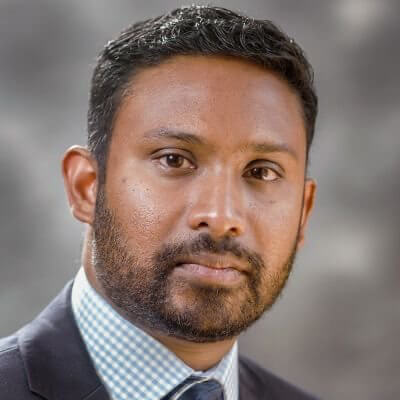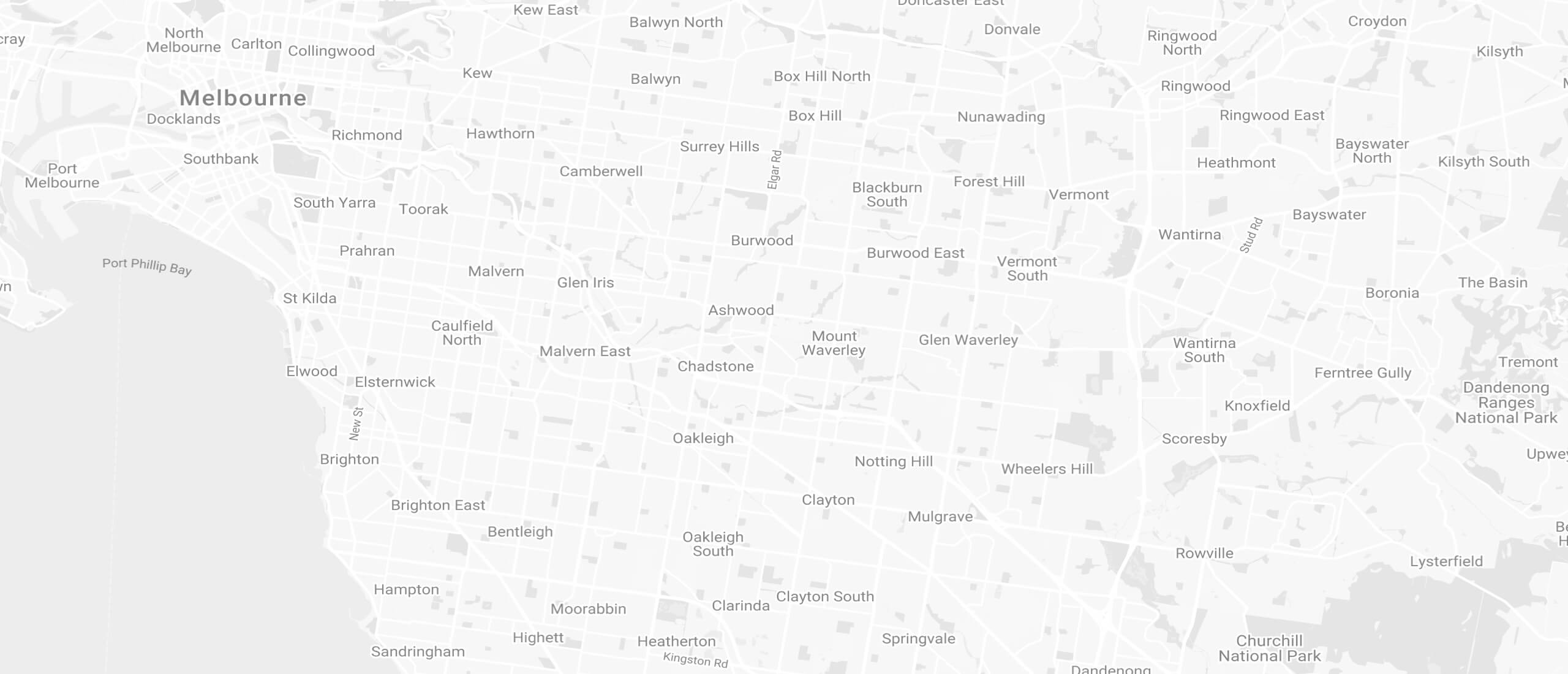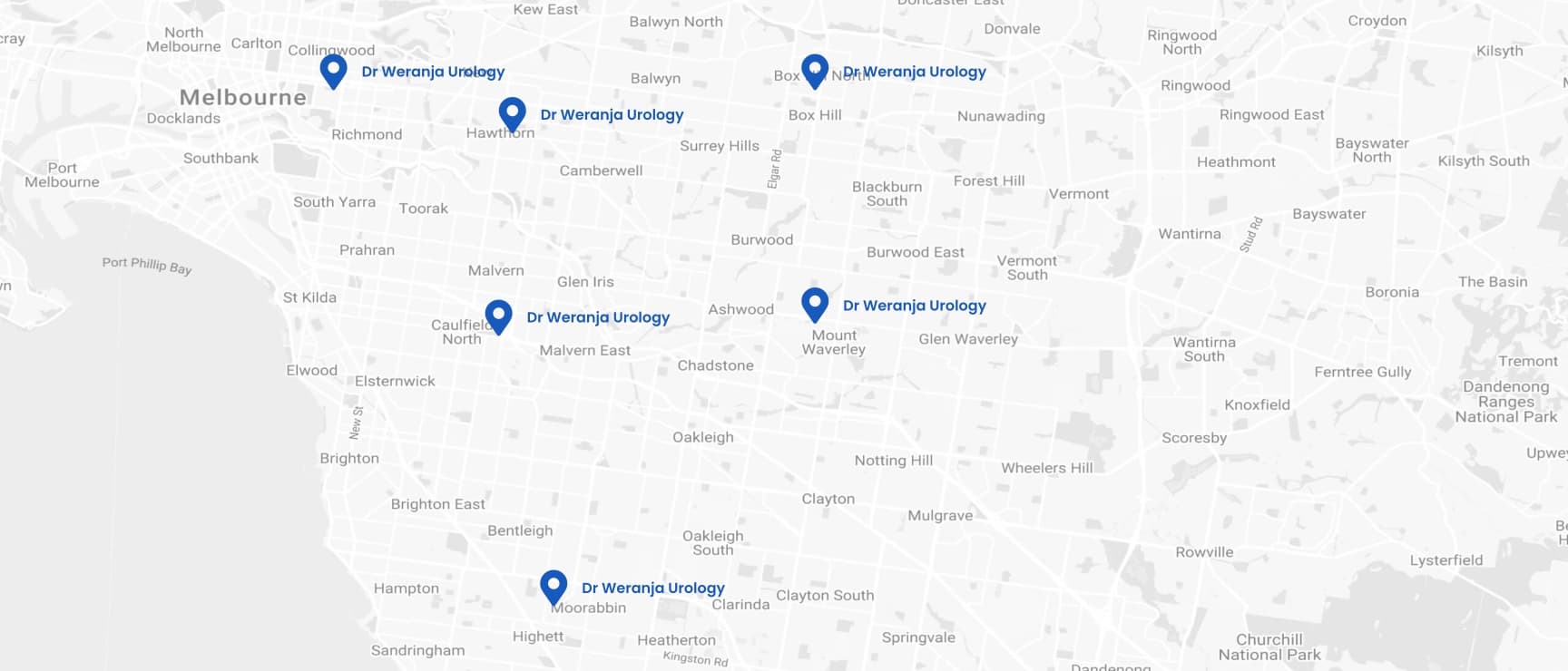Melbourne urologist
kidney conditions
Melbourne urologist kidney conditions
What is the role of the kidney?
Melbourne urologist kidney conditions
What are the symptoms of kidney stones?

‘Typically, kidney stones are made of calcium oxalate, uric acid, struvite, and cysteine. The stones can then move down the tubes that transport urine to the bladder (ureters). The stones can block these tubes causing pain and that is called renal colic.’
The most obvious symptom is sudden excruciating pain that comes on in waves on either side of your lower back.
Other symptoms include:
- A vague ache on the side or in your stomach
- Discoloured, foul-smelling urine
- Blood in your urine
- Fevers
- Nausea or vomiting
Especially if you have a fever and you experience severe symptoms, you should get urgent medical help.
Causes and diagnosis of kidney stones
As your urologist, I will organise your lab and urine tests. They help us assess your kidney function and look for infections. You will also need to get an X-ray or a scan (CT, ultrasound, or MRI) to diagnose and give us more information about the kidney stone.
The most common cause of kidney stones is not drinking enough water (dehydration).
Other causes include:
- Diet: eating lots of salt, sugar, and protein may put you more at risk of developing kidney stones. Especially diets high in sodium are putting a lot of pressure on your kidneys to filter waste products out of your body.
- Family history: someone in your family already had kidney stones or you have had them before.
- Obesity: a connection between obesity and kidney stones has been demonstrated
- Obesity surgery: there is also a connection between weight loss surgery (gastric bypass) and the risk of kidney stones.
- Inflammatory bowel disease: this can cause changes in your digestive process that leads to more buildup of waste products.
- Medication and supplements: use of vitamin C or laxatives for example
Treatment of kidney stones
Kidney stones under 5mm will generally pass without a procedure. Larger stones may block your kidney and that may cause pain or damage your kidneys. Depending on the size and location of your kidney stones, we have a number of treatment options:
- Laser: a small camera goes through your urethra into the bladder and the kidney (ureteroscopy). Lasers are used to break down the stone to remove them.
- Shock wave lithotripsy: ultrasound waves are used to break down your kidney stone, in a noninvasive procedure.
- Percutaneous nephrolithotomy: an instrument is passed through your back into your kidney to remove larger stones.
To avoid kidney problems and kidney stones, there are a couple of good habits you can introduce. Drinking up to 3 litres of water a day is a good starting point, and so is reducing your salt intake. You also may want to reduce your intake of red meats and make sure you stick to a balanced diet with the right amount of calcium.
Some stones (oxalate) can be reduced by avoiding foods such as spinach and rhubarb because they are rich in oxalate. Overall, keeping a healthy weight and building in physical activity, are good habits to avoid kidney stones.
Melbourne urologist kidney conditions
Kidney masses and cysts

Melbourne urologist kidney conditions
Kidney cancer
You may experience symptoms such as blood in your urine, back pain, or a general feeling of being unwell: feeling tired, weight loss, loss of appetite, fever, or bone pains.
To diagnose kidney cancer, I help you organise routine urine and lab tests, to check your kidney function. CT scans and X-rays of the chest also give us valuable information and we may order a biopsy.
The established risk factors for kidney cancer are:
- Age: as you grow older, your risk of kidney cancer increases
- Obesity: with obesity, you have a higher risk than people with a healthy weight
- Smoking: increases your risk of kidney cancer
- Hypertension: high blood pressure is also known to increase your risk
- Kidney failure treatment: if you are on dialysis to treat chronic kidney failure, you are also a high-risk patient to develop kidney cancer
- Family history: inherited syndromes or a family history that includes kidney cancer puts you at a higher risk as well.
Kidney cancer treatment
Kidney cancer treatment by your urologist will depend on the size and aggressiveness of the cancer and on your general health.
Active surveillance is used to learn about the growth rate of the tumour. If it is slow-growing, then observation with frequent scans or biopsy is recommended.
A partial nephrectomy means that I surgically remove part of the kidney in open surgery or robotic laparoscopic surgery. The majority of the kidney is preserved so we balance out cancer control and renal function. However, there is a slightly higher risk of complications with this technique, compared to removing the entire kidney.
Radical nephrectomy means that we remove the entire kidney and in some cases the adrenal gland, part of the ureter, and some lymph glands. I offer robotic, laparoscopic, or open surgery types. There can be small risks of bleeding, infection, or injury to other organs associated with a nephrectomy. With reduced kidney function, there can be an increased risk of chronic kidney disease and hypertension.
Ablation of the tumour means that we use high-energy radio waves (Radio Frequency Ablation) and heat to destroy the tumour or a freezing technique (Cryo Ablation). The methods are minimally invasive but carry higher risks compared to surgical techniques. There are additional risks of bleeding or tumour recurrence.
Metastasised cancers will need systemic or targeted therapy or immunotherapy. Once a cancer has spread, a medical oncologist will assist to plan the most appropriate kidney cancer treatment.
Melbourne urologist kidney conditions
Hydronephrosis and Obstruction
The swelling of the kidney will cause flank pain, sometimes intermittent, or when you drink alcohol or coffee. The pain can radiate down to your groin. If you also have an infection you may feel quite ill and have high fevers. In that case, you need urgent hospitalisation and emergency drainage. The condition can be caused by inflammation, kidney stones, scar tissue, or a tumour.
One of the congenital conditions which cause hydronephrosis is called pelvic ureteric junction obstruction. Urologists use different terms to describe this type of obstructions: PUJO or ureteropelvic junction obstruction. If you have symptoms from this, generally you will need a definitive surgical procedure to resolve this.
Besides open surgery to treat pelvic ureteric junction obstruction, we have different less invasive treatment options:
- An endopyelotomy uses a telescope or a laser. We cut scar tissue open from the inside and the procedure is done as an outpatient. You would keep an internal tube for four to six weeks.
- A laparoscopic pyeloplasty is performed as open surgery but with a smaller incision. This requires hospitalisation and an internal stent for four weeks.
Urologist Melbourne
Why A/Prof Weranja for kidney conditions?
I understand that problems with your kidney can be quite debilitating. If you have pain caused by a kidney stone, you want to get back to your normal life or get back to work. I also understand the anxiety if you have been just told that you have a lump or shadow on your kidney.
As an accomplished academic surgeon, my aim is to fully evaluate your kidney condition and work with you to make sure we discuss your needs. We then focus on providing you with the highest level, most individualised care. It is always tailored to your needs and your situation. If you have a kidney stone, prevention of future stones is key and we will go through this with you.

‘I build on extensive experience in both open surgery and minimally invasive kidney surgery. That helps to aim for the best possible treatment and the fastest, more comfortable recovery. ’

- Camberwell Road Specialists and Allied Health
- Ground floor, 124 - 126 Camberwell Road
- Hawthorn East VIC 3123
- Waverley Private Hospital
- 343-357 Blackburn Road
- MOUNT WAVERLEY VIC 3149
- Holmesglen Private Hospital
- 490 South Road, Suite A1,
Moorabbin VIC 3189
- Epworth Eastern Hospital,
- 1 Arnold St,
- Box Hill VIC 3128
- Epworth Freemasons Medical Centre
- 320 Victoria Parade,
1st Floor, Suite 103
East Melbourne VIC 3002
- Cabrini Hospital Malvern,
- 181/183 Wattletree Rd,
- Malvern VIC 3144

